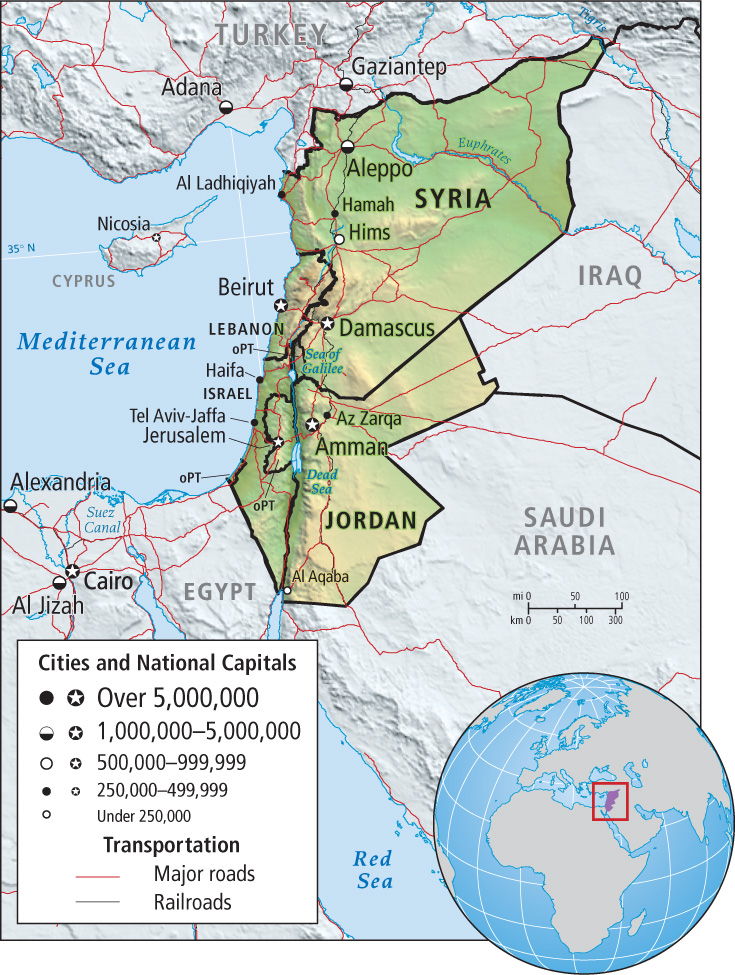The Eastern Mediterranean
Jordan, Lebanon, Syria, Israel, and Palestine have all been preoccupied over the last 60 years with political and armed conflict. Much of this arose out of the establishment of the state of Israel, but rivalry over access to land and resources, as well as agitation for greater political freedom, has driven many conflicts (Figure 6.36). In the 1970s, the Arab-Israeli conflict spilled over Lebanon’s borders and exacerbated discord between Christian and Muslim Lebanese, resulting in a long civil war that lasted until 1990. Lebanon was actively rebuilding its economy and infrastructure when an armed conflict between Hezbollah (an anti-Israeli militia) and Israel destroyed much of southern Lebanon in 2006. Syria has had conflicts with most of its neighbors for many years and was itself plunged into civil war when its government tried to repress Arab Spring protests.

All Eastern Mediterranean countries have scarce water supplies and must face the likelihood that climate change is already making the situation worse, as indicated by the decade of drought that is likely to continue. The various strategies to acquire more water are discussed, but there are no easy solutions to the problem. Irrigated agriculture appears to be failing, which may be fortuitous since agriculture is the biggest user of water. Rapid urbanization is increasing per capita water use, in part because piping water into homes removes people from personal familiarity with acquiring water from its sources in nature, leading to more wasteful habits.
349
If the Israeli-Palestinian tensions and Syria’s civil war were resolved, the Eastern Mediterranean could become the economic leader in the region. The countries of this subregion are strategically located adjacent to the rich markets of Europe and the potentially lucrative markets of Central Asia and the Persian Gulf states. Their climate makes them suitable for tourism and for subtropical export agriculture. Jordan already exports vegetables, citrus fruits, bananas, and olive products. If irrigation water could be found and used sustainably (not an easy matter), Syria could also do export agriculture. Syria lost Russia as an important trading partner after the breakup of the Soviet Union in 1991, but Russia has aided the Assad regime with weaponry and other assistance. Until the recent civil unrest, private investors, especially those from the Gulf states, were helping Syria expand its industrial base to include pharmaceuticals, food processing, and textiles, in addition to gas and oil production.
Some argue that Israel could be a model of development for neighboring countries. Despite its rather meager natural resources, Israel has managed to develop economically and now has the most educated, prosperous, and healthy population in the region (see the GNI and HDI information in Figure 6.24). Israeli engineering is world renowned, and Israeli innovations in cultivating arid land have spread to the Americas, Africa, and Asia. A range of sophisticated industries is located along the coast between the large port cities of Tel Aviv and Haifa. Moreover, Israel benefits from qualities that other countries lack. As the homeland for the world’s Jews, it has a pool of unusually devoted immigrants and financial resources contributed by the worldwide Jewish community and a number of foreign governments, particularly the United States. Regardless, the reality is that Israel’s continual conflicts with its neighbors have turned Israel into an armed fortress and constrained economic growth. In response, increasing numbers of young and highly trained Israelis are leaving the country, while ever-smaller numbers of Jews from other parts of the world are choosing to migrate to Israel.
THINGS TO REMEMBER
 Access to land and resources, as well as religious rivalry among Muslims, are critical issues for the countries of the Eastern Mediterranean subregion.
Access to land and resources, as well as religious rivalry among Muslims, are critical issues for the countries of the Eastern Mediterranean subregion. Water scarcity is a rising issue.
Water scarcity is a rising issue. Resolving the hostility between the Palestinians and the Israelis would provide a great stimulus to economic growth and human well-being for the states and peoples of the subregion.
Resolving the hostility between the Palestinians and the Israelis would provide a great stimulus to economic growth and human well-being for the states and peoples of the subregion.